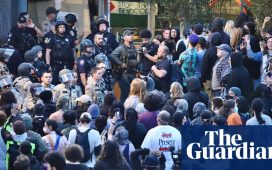
GSV Ventures managing partner Deborah Quazzo joins Common and Khan Academy founder Sal Kahn for a … [+]
Education is in the spotlight like never before, as K-12 schools and colleges grapple with the complexity of engaging students amidst remote learning—and millions of newly displaced workers face the challenges of developing new skills to thrive in a forever-changed, post-COVID-19 economy.
In the wake of a once unimaginable health crisis, and a long overdue reckoning on race and social justice, I’m convinced that innovations in education can lead us to a more inclusive future. Now is both a critical time for innovation—and a moment to rethink the paradigm of education that has left so many of our students at risk of historic learning loss this year.
Described by the New York Times as the “must attend” event for a growing, global community of educators and entrepreneurs, philanthropists and investors, the annual ASU+GSV Summit has evolved into a global forum for a diverse community of thinkers and doers working to transform the education ecosystem. The event is the brainchild of my friends Michael Moe (whose 1996 paper, Dawn of the Age of Knowledge, forecasted many of the trends we are witnessing today) and Deborah Quazzo, who is not only education’s most prolific investor, but a force of change and creative inspiration for education innovators across the country (myself included).
It was actually one of ASU+GSV’s earliest convenings, in 2010, that sparked the idea that led me to found my organization, LEAP Innovations. I found my jaw dropping all week, hearing about new approaches, new technologies, the future of education. I knew the concept of connecting innovation and education had to be an imperative for the children in my home city of Chicago—and children around the country. I returned with a vision for a whole new kind of organization in my head, one that envisioned connecting innovation and education to tailor learning for every student, every day.
The ASU+GSV community convenes, this week and next, with a heightened sense of urgency as the pandemic continues to expose cracks and fissures in every aspect of our educational infrastructure. That imperative is drawing the energy and insights of everyone from General Colin Powell to the New York Times best-selling author Isabel Wilkerson to the summit to former U.S. education secretary John King and political activist Gloria Steinem. This year, the summit is as much about showcasing the world’s most promising innovations, as it is about identifying educational breakthroughs in a moment where longstanding crises are in sharp relief.
Over the next two weeks, the event reflects on what education looked like B.C. (Before Coronavirus) and considers the possibility that we might emerge stronger A.D. (After Disease). It will challenge each of us to consider how the swift, digital transformation of education might set the stage for more enduring changes that make good on the promise of not just equal access, but deeper and more powerful learning at all levels.

Deborah Quazzo, managing partner, GSV Ventures
I had the chance to talk to Deborah about what is in store for their approach this year—and learn how the programming has evolved in response to the moment. While the event takes place over the next two weeks, the content will be available to revisit online and will no doubt inform our thinking and action in the year to come.
Phyllis Lockett: The overarching theme is B.C. to A.D., The Dawn of the Age of Digital Learning—Imagining an Era in Which All People Have Equal Access to the Future. Coming out of COVID-19 at some point in 2021 (we pray!), what do you think the lessons will be for K-12 educators? For parents who have been party to the at-home learning?
Deborah Quazzo: This is a great question, but I might frame it slightly differently. To be sure, there are lessons to be learned for educators, but the enduring impact of the pandemic may be lessons that we are learning from educators.
The shift to remote learning has laid bare the sort of endemic inequities that educators face every day. Equity has always been at the core of the summit’s programming—but I think you’ll see and hear an increased emphasis and awareness of gaps that were, in so many ways, exacerbated by the shift to remote learning.
Although the digital divide has dominated the headlines, the pandemic has also exposed the extent to which food insecurity, homelessness and trauma impact learning. The tragedies of 2020 have instilled, in all of us, a much deeper appreciation of the role that schools play in our communities—and economy—as a result of the pandemic. When schools close, many parents are unable to go to work in the short-term and students lose out on essential skill development in the long-term. This month, the Organization for Economic Cooperation and Development estimated that school closures during the pandemic could cost the economy nearly $14.2 trillion over the next 80 years.
Most of all, parents have a better understanding, and perhaps even an increased sense of gratitude, for the skills and role that teachers play in the lives of children in the classroom—and beyond. There is also, I think, a heightened awareness of the imperative for change. None of this is new to teachers, of course, but it has permeated our collective consciousness in ways that I’m not sure it did six months ago.
Lockett: One potentially tragic outcome of the move online is the students who will be left further behind and suffer from learning losses. What program at ASU+GSV speaks to these issues and how we might overcome them?
Quazzo: The extent to which the pandemic is exacerbating equity gaps is absolutely tragic. According to an analysis from Curriculum Associates, more than 90% of students in the highest income bracket returned to normal usage of their platform within three weeks of school closures. Just half the students in the lowest bracket were using their software as regularly as they had been prior to closures. There are bright spots as well—districts like Miami Dade have done absolutely heroic work to stem gaps and bridge the digital divide.
What often gets overlooked is the fact that these gaps extend well beyond K-12.
Course Hero, one of edtech’s newest unicorns, surveyed 14,000 students on its platform, and found that food and housing insecurity each accounted for a quarter of students’ overall emergency aid needs. A striking number of displaced college students didn’t have access to laptops or Wi-Fi.
In the world of work, we know that workers without degrees are the “first fired, and the last hired.” That’s especially troubling given recent reports that low income college students are dropping out at an alarming rate, due to connectivity challenges (among others). Some economists have described the pandemic as an “automation forcing event,” suggesting that as many as 40% of jobs lost may never come back.
The programming this year is about recognizing how far we have come—while simultaneously acknowledging how far we have to go. From Makaziwe Mandela, Nelson Mandela’s daughter, to best-selling author Malcolm Gladwell, much of this year’s programming will explore the tensions between the potential of innovation to close gaps and promote a more equitable recovery, and the mitigation of risks and unintended consequences during a period of transformative change.
I expect that the power and peril of learning pods will be a hot topic. Chris Bennett, who is an impressive, young entrepreneur and the founder of Wonderschool is going to take on tough questions about pods, on a panel moderated by Linda Jacobson from The 74. I’m proud that our 2020 Innovator of Color honoree Carlos Moreno, who leads Big Picture Learning, is on another panel that asks whether online education might actually foster the sort of deeper learning that we need to close equity gaps. We’ll hear from Common App CEO, Jenny Rickard about the transformation of college admissions. Kai-Lee Burke, who is one of the leading thinkers about early childhood education, is going to talk with state leaders and policy experts about what they’re doing to ensure not just continuity—but quality—of pre-K programs in the face of tremendous challenges and uncertainties.
When it comes to the future of work, former Obama Administration labor secretary Seth Harris will help us to understand how the policy world is responding to an unemployment and workforce challenge that we have not seen since the Great Depression. We’ll be joined by the leaders of social impact organizations like Imaginable Futures and Strada Education Network, who are working to reimagine the education and workforce ecosystem, to hear about their philanthropic work and investments. We will hear from leaders like Guild Education founder Rachel Carlson (another recent edtech unicorn), Penn Foster’s Frank Britt and JFF CEO Maria Flynn, who are working at the intersection of education and employment to create new pathways for displaced workers.
Lockett: Social and emotional learning and support for students, teachers and parents has become even more paramount in the pandemic. How do ASU+GSV program leaders speak to this critical need?
Quazzo: You’re exactly right. In some ways, the rise and recognition of SEL’s importance may actually prove to be a bright spot, when we reflect back, years from now, on how the pandemic has transformed education. At the summit, we’ll be joined by Marc Brackett, from the Yale Center for Emotional Intelligence, who has partnered with celebrities like Lady Gaga to help young people better understand and process their emotions. He is author of the recent, and terrific, book Permission to Feel: Unlocking the Power of Emotions to Help Our Kids, Ourselves, and Our Society Thrive. Turnaround for Children founder Dr. Pamela Cantor, who specializes in the impact of trauma on learning and has practiced child and adolescent psychiatry for nearly two decades, is speaking about how the science of early childhood development can inform practice as children return to school.
Great teachers have long understood the connection between the ability of children to manage their emotions or cope with stress to their ability to accomplish a task. Despite a growing body of research and an increased attention from entrepreneurs on topics like growth mindset, socioemotional learning has in many ways existed at the periphery. But parent-educators are now grappling with socioemotional challenges—and benefits—head on. That’s yielding not just empathy for educators, but an understanding of the connection between socioemotional development and educational outcomes.
At the summit this year, I think you’ll see that awareness manifest through the growing number of entrepreneurs focused on building solutions that support socioemotional learning. This work is already a major priority for the Bill and Melinda Gates Foundation and others on the philanthropic side. I expect that investors (many of whom are now parent-educators themselves) will also be taking note of SEL as an investable category.
Lockett: While the ASU+GSV community would love to convene live in San Diego as they have for the past decade, the move to a virtual format has brought some benefits. What can we expect with the new format? And for those who have never joined before, why is this a unique opportunity?
Quazzo: Although we are disappointed that we can’t all be together in person, our team and community have embraced the moment to create an experience that we think participants will find to be powerful in ways that they might not expect.
This will not be your typical online event.
More importantly, we’re now providing an opportunity for people who might not have otherwise joined our community to understand the landscape of edtech, understand who the great minds from around the world are, and get a taste of what the in-person summit will look like next year.
We hope that this year’s format will actually democratize the summit by drawing new ideas from people who wouldn’t otherwise be able to join us in person. What a lot of people might not realize is that the summit has really evolved into a global community in recent years. We launched our first event in China in 2018, and the online environment will allow us to create a far more inclusive, global event than we could have ever imagined in another world. This year we have registrations from more than 133 countries.
The new format will be broken up in two weeks with highly produced content. There will be eight programming channels each day, interactive networking opportunities, and you will get the chance to hear from impressive thinkers and leaders like Eric Yuan, Bill Nye the Science Guy, and Anand Giridharadas, along with other incredible educators and innovators.
Lockett: Coronavirus has surfaced the value that technology can play in providing access to education. Will the pandemic forever change the way we learn? What edtech innovations do we already see coming out of COVID-19?
Quazzo: I think that it will. The genie is out of the bottle and while we still have work to do, the level of enthusiasm we’re now seeing for doing things differently will have an enduring impact.
Consider that before the pandemic, one in six families were using ClassDojo to create a community around the classroom and communicate with teachers. It has already seen 12 times growth this year. Coursera has also seen a dramatic increase in users since the beginning of the pandemic because of the quality programs it was able to offer to college students and working learners.
General Assembly, which was still largely in-person, moved quickly and has now transitioned its entire program online, with great results. We’re seeing a massive uptick in the use and adoption of digital credentials and badges as workers navigate what Rachel Carlson has described as a labor market riptide.
Blackboard founder Michael Chasen has gotten into the mix with Class for Zoom, which takes aim at the challenges that classrooms are facing when using Zoom by designing for classrooms and teachers who are demanding a more engaging learning experience.
I think it’s important to note that the shifts we’re seeing are not just about technology—the preferences of education consumers are shifting. According to Strada Education Network’s massive ‘education consumer’ surveys, education consumers are demanding not just greater value—but greater relevance from their education investments. In response, colleges like National University (in our usual host city of San Diego), Southern New Hampshire University and others are actually cutting tuition. Gap year programs are on the rise. They are going virtual in some cases. At the summit, we’ll hear from higher education players like Minerva about how they are transforming their programs in response to the pandemic, as well as Verto Education, which is partnering with colleges to reimagine the first year experience by creating what amounts to a “gap year without the gap.”
As you can see, it’s an extraordinarily impressive group—and a really diverse mix of issues and participants. I’m certain that you will be inspired by the creativity of educators and the passion that entrepreneurs are bringing to solving complex problems. And I’m hopeful, as always, that the conversations we start will reverberate well beyond the “walls” of the summit.
The conversation has been edited and condensed for clarity.




